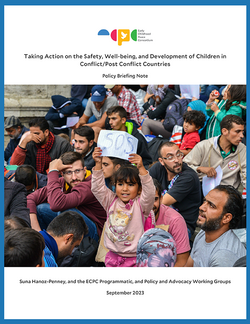 Executive Summary
Executive Summary
Humanitarian crises including the war in Ukraine and the ongoing crisis in Syria, among others—pose a substantial threat to children’s health, safety, and development. In addition to the physical threats and psychological traumas posed by war and mass displacement, children in such crises suffer severe deprivation, including lack of adequate nutrition, medicine, education, and clean drinking water. Exposure to such and resulting toxic stress leads to significant harm for children’s short- and long-term health and well-being.
Early child development (ECD) interventions are critical to addressing these threats globally. Growing evidence suggests appropriate ECD programming, supported by psychological first aid and psychosocial support, can mitigate harms to young children and families living in contexts of war, displacement, and other humanitarian crises. Yet, it is disturbing that neither integrated ECD interventions, nor early care and learning for children more generally, have been prioritized by governments and agencies in emergency contexts.
Governments, donors, organizations, and other international actors must act now to uphold international commitments to prioritize the rights of children and ensure adequate funding and support for all children in crisis. The ECD research and practitioner community must also act with urgency to strengthen the case for ECD interventions in emergencies, including employing more effective communications and addressing research gaps. Frontline workers, including families, should be empowered with the knowledge and tools to support the holistic development of children, especially in situations of conflict and crisis.
We urge governments, donors, organizations, and other international actors to prioritize integrated ECD interventions inclusive of early learning and early care in emergencies.


